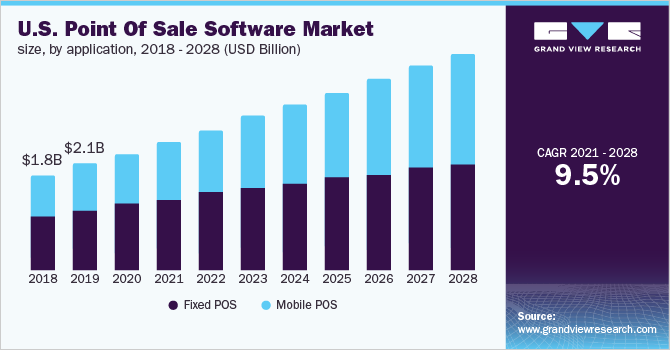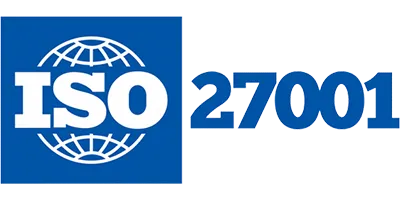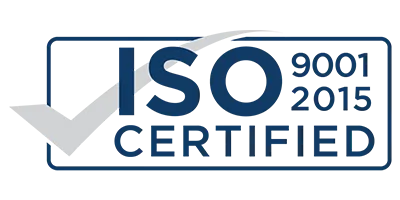The dynamics of the market are dramatically changing, and so is the way customers interact with businesses. If businesses don’t cope with technological innovation, then they face severe consequences. One of the recent needs of the hour is POS application development.
POS system, also known as the Point of Sale., is a system that enables businesses to conduct sales at brick and mortar, as well as at eCommerce stores.
According to a survey, the global market of POS software was valued at USD 9.29 billion in 2020, and it is expected to grow at a CAGR of 9.5% from 2021 to 2028.

For customers, standing in a long queue at a cash register is so old school. In the present technologically driven world, the POS system accelerates the sales process, and it also simplifies the billing, promotions, returns, and other processes with utmost ease.
Different Kinds of POS System
In the present time, POS systems are trending across the globe, and it has become essential for maintaining business records. The modern shoppers and shopkeepers are enjoying this rending technology, and it has paved the path of POS application development and opportunities to grow for POS software development companies.
The simplicity of the solution makes it highly popular among users. Its main job is to generate an invoice for the products and services purchased.
There are several types of POS systems. Before you hire a POS software development company, make sure you understand these types.
Mobile Point of Sales (mPOS)
Evident to its name, this type of POS system is integrated with mobile devices like tablets, smartphones, etc. This system is compact with tools like a card reader, barcode scanner, etc.
mPOS can help you manage inventory in the easiest manner. You can monitor real-time sales and perform many other amazing tasks.
Cloud-Based Point of Sales (Cloud POS)
As its name suggests, these types of POS runs on a cloud ecosystem. Users can maintain cloud POS with the help of data centers provided by the vendors of POS.
Businesses can easily integrate Cloud POS with the current framework. It also mingles with the functionalities of the existing frameworks.
Terminal POS
Such Point of Sales systems are more popular in the stores and outlets like grocery stores, restaurants, and other brick and mortar stores. The terminal POS helps businesses deal with issues prevailing in the industry. It maintains certain standards, which can be integrated easily into any kind of framework. Terminal POS systems are comparatively budget-friendly.
Some Most Popular Point of Sale Software Systems
- Shopify
- The Merchant Solutions
- PayCafe
- Revel
- Squareup
- Shopkeep
- Inuit Quickbooks
- Lightspeed
Features to include in POS application
POS app development is a complex process. A business has to keep a close eye on the latest trends while going for custom POS development services. Below are some advanced level features that if you integrate into your system, you will get marvelous benefits.
Integration
There are multiple functions that you expect your POS system to perform. These features include bookkeeping, employee management, inventory management, and many more.
To enjoy all these functions, you need to develop POS software that can get easily integrated with different modules that accelerate this system.
Employee Management
You can easily manage your team of employees across departments through this integrated feature of POS. You can check the in and out the time of an employee, their schedules, and payroll, to name a few.
Customer Management
The POS system helps you with customer relationships and experience. You can store your clients’ data in the POS system as purchase history and start offering them a personalized experience based on their purchase history.
Through this, you would come to have a clearer picture of the interested customers who would purchase from you.
Stock Management
Management and maintenance of the inventory is a time consuming and tedious task, which you can simplify with the help of a POS system. Large and small businesses can update and count their stock in an easy manner.
Reports & Analytics
For any business, making reporting is challenging work as it requires lots of brainstorming along with vivid permutations and combinations. Hire a POS system development company that has the proficiency in building a POS system that is capable of tracking sales & inventory, and which can prepare reports based on the given data.
Easy Accessibility
Accessibility is another feature that you should keep in consideration at the time of the POS application development process. Ask your POS system developers to build such a system that can be easily accessible through mobile and tablets. Make your system accessible from anywhere and anytime.
Here is the list of other essential features of the POS system, which you can include –
-
- A system that can streamline the purchases
- A feature that improves and maintain customer relationship management
- A system with sturdy security
- A system with higher reporting
- Advance billing system
- Content management system to maintain stock information
- Feature of loyalty programs and discounts
The List of Hardware and Software Required in a POS
At the present time, most retail businesses are hiring POS system developers for Custom POS software development. There is a myth that POS systems only generate invoices, but the truth is that it serves myriad purposes which are really helpful for businesses.
If you are looking for the best POS app development services, you have to prepare yourself with full knowledge, which includes the knowledge of hardware and software required for POS system development.
Software Components for POS
- On-Premise
It is the traditional model. In this model, a user first purchases all the licenses and then installs them into their local system servers. The maintenance of on-premises POS is a very time & energy-consuming task. For a large-scale business, an entire IT team is required to handle POS-related issues.
- Cloud or SaaS
The cloud POS is the evolved version of the traditional ones. A user only has to have an active internet connection to access this system. In the absence of an internet connection, POS works perfectly but with limited features.
The best part is that when it gets connected back with the internet, all the data will get synced.
Modern businesses are seeking cloud or SaaS-based POS development solutions as they are easy to access and easy to use.
Hardware Components for POS System
Cash Drawer
It is the first and foremost element that brings completeness to a POS system. The cash drawer works as a repository that holds cash and receipts. When the drawer connects with the POS system it will reflect the accurate number of times a cash drawer is opened.
Barcode Reader
Most retail stores use barcode readers which streamlines the purchase and selling process. It is useful in finding product information such as price, stock levels, comprehensive description, etc.
Receipt Printer
A business also needs a small printer through which it can print the slip of orders placed by the customers. Businesses have the liberty to customize the receipts by placing their business logo.
There is also an option to go digital where there is no need for a paper receipt.
Display
At the present time, there are many POS options that have customer displays that are helpful in verifying the items scanned along with other features like customer details, amount billed, promotion details and payment option selection.
Card Reader
Another hardware investment goes into a card reader. Customers today prefer making cards via cards. The payment by card is easy, rapid, and secure.
It mitigates the hassle of finding required cash currency and time-consuming efforts which delay the POS process.
How Much Does it Cost to Build a Point of Sale Software System?
There are various factors that affect the development cost of POS applications. These factors are – app development platform, number of basic and advanced features, 3rd party API and platform integrations, a timeline for completion of a project, region (country) of a development team, and many more.
However, to give you a ballpark figure, we would say that the cost of the development of POS software ranges between $40,000 to $50,000. The POS within this price range comes with the basic functionalities, whereas the POS system with advanced features and mobile compatibility ranges between $65,000 to $90,000.
Is it the Right Time to Go for POS Application Development?
Yes, this is absolutely the right and perfect time to invest in custom POS development services. After the pandemic, the way customers make purchases has dramatically changed.
A business has to spend 2 to 3 percent of annual revenue on the purchase of the POS system and development, and 13 to 13 percent on its maintenance.
Give your retail business a boost of productivity and efficiency through POS application development.








